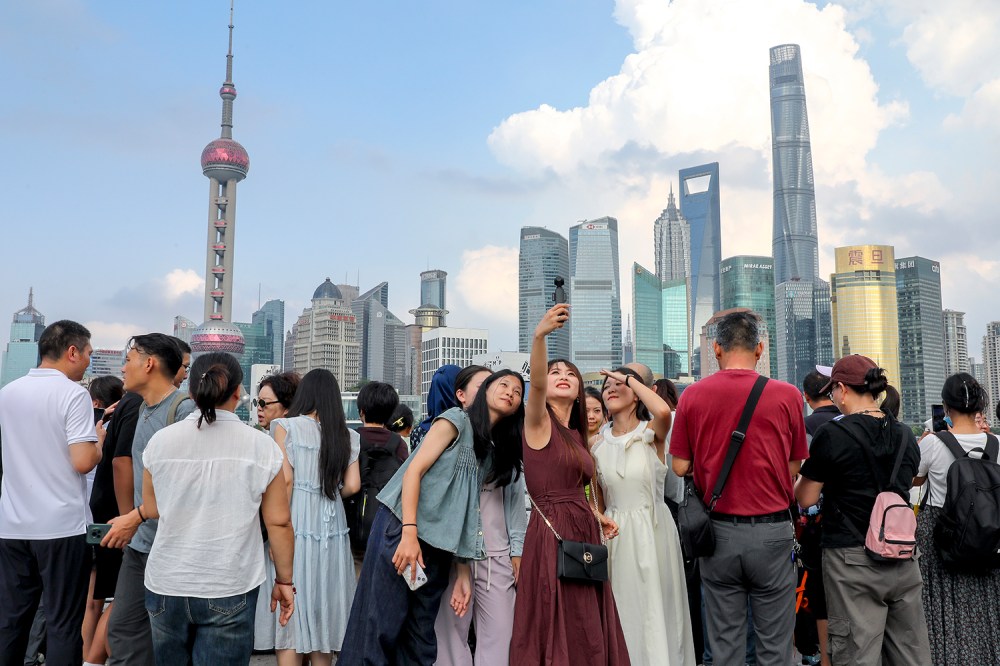Welcome to Foreign Policy’s China Brief.
The highlights this week: Chinese travelers celebrate a national holiday, a senior diplomat receives a big promotion, and youth unemployment numbers spike.
National Holiday Gives Boost to Tourism
It’s been a slow week for news in China because of the ongoing national holiday. The country is celebrating a “Golden Week” from Oct. 1 to Oct. 8, marking the anniversary of the founding of the People’s Republic of China. This year, the holiday coincides with the Mid-Autumn Festival, making it a slightly longer “Super Golden Week.”
It’s a popular time for Chinese people to travel, both within the country and internationally. As many as 8.4 million people are expected to travel abroad during this week’s holiday—more than double the 3.8 million people who did so last year.
China is the world’s top outbound tourism spender, with Chinese travelers spending $250.6 billion abroad last year. That puts it ahead of the United States, where people spent $177.8 billion on travel in 2024. This year, Chinese travelers are expected to make about 155 million outbound trips, exceeding pre-pandemic figures for the first time.
That is a lot of money—and a lot of potential soft power. In Southeast Asia, the region containing some of the most popular destinations for Chinese tourists, this influence is visible. Chinese-language signs, Chinese-speaking guides, and Chinese payment systems are everywhere. But it’s also evident in European cities, such as Milan or Paris, where many travel experiences and amenities cater to Chinese tourists.
While China generally emphasizes domestic tourism—at nearly $1 trillion last year, Chinese travelers spent around four times as much traveling within the country as outside of it—officials welcome soft power influence, too, though they also sometimes worry about Chinese travelers getting a bad reputation abroad.
China’s outbound tourism figures are largely a result of its sheer size, but they are also somewhat deceptive, because they include tourism to Hong Kong, Macao, and Taiwan, which together make up 30 percent of the total. Hong Kong and Macao are both legally and practically part of China, and day trips from the mainland are quick enough that some people commute to and from mainland China for work.
Still, these outbound figures are lower than they could be. China’s so-called passport power—a measure of the number of destinations that its citizens can access without a prior visa—is surprisingly weak. Ranked by the Henley Passport Index at 62nd in the world, China is in the company of countries such as Botswana and Kosovo. (Though China has a substantial population of well-off travelers that countries want to attract, it has even larger population of poor potential migrants that countries want to deter.)
It can also be a pain just getting a passport in China. Only around 160 million people—roughly 11.3 percent of the population—hold a passport, though 300 million hold the entry-exit document needed for travel to Hong Kong or Macao. (For comparison, around 51 percent of Americans have passports, which is still low for a rich country.)
Two of my Chinese friends have described having to bribe officials to get their passports, and civil servants—including teachers and nurses—often have to hand their passports over to their employers and apply for permission to travel abroad.
Another problem that limits Chinese travel is scarcity of vacation days. In a hangover from the work-obsessed culture of Maoism, working-class Chinese often don’t get vacation days at all, even though the law mandates a minimum of five after the first year of employment. Most office workers get that minimum five, which goes up to 10 after a decade in the same job. But that continuity is a rarity, outside of government, in a country where job-hopping is frequent.
That means that everyone has to cram their travel into the same two major national holidays: the autumnal Golden Week and the Spring Festival celebrating the beginning of the Chinese New Year. Even those holidays are more limited than they seem, since workers are often required to make up days on either side of the holiday.
Overall, Chinese tourism is growing fast, and Chinese travelers are increasingly younger and more interested in the world. In an age of brutal global divisions, exposure to other viewpoints and people has to be a good thing.
What We’re Following
Party promotions. Liu Haixing, a senior diplomat, has been named the head of the International Department of the Chinese Communist Party (CCP). He replaces Liu Jianchao, who was detained for questioning upon returning from a work trip abroad in late July and will likely face future charges. I would wager that he will be charged with corruption, but given his role in dealing with foreigners, espionage is a close second.
As longtime China watcher Bill Bishop points out, this makes Liu Haixing the favorite to take Wang Yi’s current spot as China’s top diplomat at the next National Congress of the CCP in 2027. On the other hand, as I noted when the news of Liu Jianchao’s detainment first broke, foreign affairs seems to be the party’s poisoned chalice, and two years is an awfully long time in Chinese politics.
Japanese hard-liners. Conservative politician Sanae Takaichi was elected as the head of Japan’s ruling Liberal Democratic Party and is almost certain to become the next prime minister during an extraordinary session of parliament next week. Takaichi would be Japan’s first woman prime minister. She is most familiar as a hard-line nationalist, following in the footsteps of former Prime Minister Shinzo Abe, who was assassinated in 2022.
Given her tough attitude toward China and nationalist positions on certain issues, Takaichi is likely to worsen relations with Beijing in the near term. One early move, if she imitates Abe, may be a visit to the controversial Yasukuni Shrine, which is seen by some as glorifying Japan’s militaristic past, including its occupation of China from 1931 to 1945. Such a visit from Takaichi would almost certainly draw an angry response from Chinese officials.
FP’s Most Read This Week
- The China-Russia Axis Is Getting Firmer, and It’s Built on Gas by Keith Johnson
- From Moldova to Africa, Russia’s Power Is Waning by Adrian Karatnycky and Alexander J. Motyl
- How Military Leaders Should Respond to Trump’s Norm-Busting by Peter D. Feaver and Heidi A. Urben
Tech and Business
Youth unemployment spike. Joblessness among 16- to 24-year-olds in China hit 18.9 percent in August, a high since the National Bureau of Statistics revised its reporting methodology in December 2023. There is widespread speculation that the real numbers are considerably higher, since this methodology excludes university students, for instance, and is believed to be tweaked in other ways.
The dire figures are a sign of low economic enthusiasm, which still lags in China even years after the COVID-19 pandemic. One reason why companies aren’t hiring is that officials, facing pressure in a tense political environment, are enforcing labor laws more forcibly than in the past, which also offers a financial boost to cash-strapped local governments.
Tech visas. Last Wednesday, China’s new “K visa” went into effect. The visa, which is aimed at attracting foreign talent in science and technology, stands in stark contrast to U.S. President Donald Trump’s recent executive order imposing a $100,000 fee on H-1B visas for skilled workers.
The Trump administration’s change has many potential high-talent immigrants scared, especially in the tech industry. But China also has a poor record of retaining its foreign tech talent, thanks to an off-putting office environment—and, frankly, Shenzhen being a far less pleasant place to live than California’s Bay Area.
The K visa plans have also sparked anger among young people in China—who, echoing nationalists elsewhere, worry that foreigners are going to steal their increasingly scarce jobs.
The post China’s Weak Passports Are Holding Back Its Soft Power appeared first on Foreign Policy.




